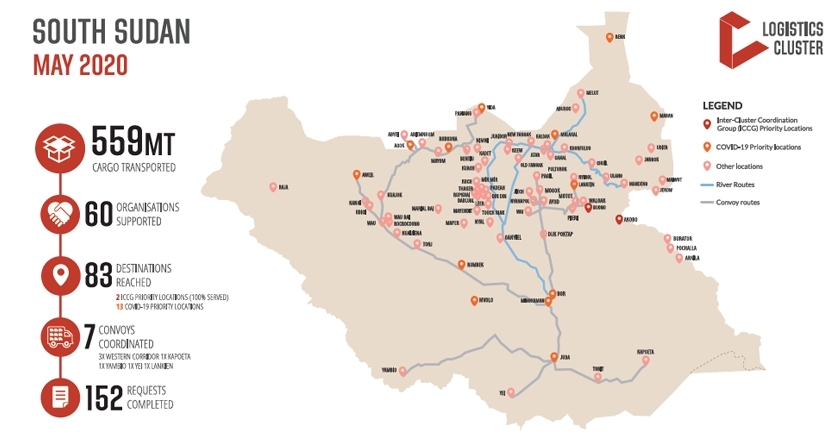Covid-19 in South Sudan: Just what the doctor ordered
The first positive Covid-19 case in South Sudan was confirmed on April 5, but weeks before that, the Logistics Cluster team was gearing up in order to adapt to this new reality.

At the beginning of his tenure with the Logistics Cluster Preparedness team, Dr. Lamin Sonko, a preparedness officer working for the Logistics Cluster in South Sudan focused mainly on the development and implementation of internal procedures in response to public health measures adopted by the government of South Sudan, such as the closure of the international airport in Juba and emerging requirements for domestic travel. Due to his medical expertise, Lamin became the Covid-19 focal point for his WFP colleagues, providing guidance and answering any and all questions.
The first positive Covid-19 case in South Sudan was confirmed on April 5, but weeks before that, the Logistics Cluster team was gearing up in order to adapt to this new reality. This required building on the preparedness measures and structures put in place following the Ebola outbreak in neighbouring Democratic Republic of Congo (DRC) in 2018 and adjusting the team for a potential new outbreak.
“Covid-19 is surrounded by a lot of myths and misconceptions,” says Dr. Lamin Sonko, a preparedness officer working for the Logistics Cluster in South Sudan. Lamin, a general surgeon by qualification, joined the team in early March. His experience became a cornerstone for building internal capacity in preparedness for the outbreak, as well as effectively responding to the changing external context and interpreting health guidance and advice from the World Health Organization and other recognised public health bodies. “Trying to sensitise my colleagues about the pandemic and the best behaviours to keep was not a joke,” he says.

Dr. Lamin Sonko, preparedness officer, Logistics Cluster in South Sudan
Lamin, who is originally from the Republic of the Gambia, started working in South Sudan in 2016. Before joining the WFP-led Logistics Cluster, Lamin worked as a medical doctor for the United Nations Mission in South Sudan (UNMISS).
“In less than two months, I had to reach out to and brief WFP personnel in Juba and in field locations around the country, more than 700 individuals in total,” explains Lamin. “I listened and tried to respond to hundreds of questions, and I realised what a phone ringing non-stop really means!”
As part of efforts to prevent the spread of Covid-19 in the general population and to ensure the safety of humanitarian workers, Lamin also used his expertise to conduct briefings for government officials, as well as for staff working in service provision at hotels and residencies in Juba where humanitarian workers live. Participants in these briefings learnt how to correctly use personal protective equipment (PPE), how to safely interact with guests who undergo quarantine, and also how to clean and disinfect residential and office premises to ensure safe work and living spaces for all. To date, almost 300 individuals have participated in these briefings.
The Logistics Cluster South Sudan participates in the National Taskforce (NTF) on Covid-19, leading the logistics and operations pillar, coordinating closely with the government, WHO and other partners, as well as sharing information and guidance with partners. As part of the National Response Plan, the Logistics Cluster supported WHO with expanding bed capacity at the Dr John Garang multi-purpose Infectious Diseases Unit by donating and installing a mobile storage unit at the site. Furthermore, the cluster-managed common storage capacity in Juba was expanded to accommodate the anticipated high volumes of Covid-19 supplies. As the number of confirmed Covid-19 cases in-country is increasing every day, the Logistics Cluster is also carrying out the central storage and management of PPE on behalf of the humanitarian community in South Sudan.
Source: Logistics Cluster


